Thursday Feb 19, 2026
Thursday Feb 19, 2026
Friday, 28 April 2023 00:05 - - {{hitsCtrl.values.hits}}

The defence sector should invest more in cutting edge intelligence technology and expertise in keeping with modern defence strategies rather than maintain an outmoded and costly manpower force
By R.W. Jayaratne
Many analysts point out Sri Lankaʼs extremely high military spending as one cause of the country’s financial crisis. It is believed that the right sizing of the armed forces within the next 5-10 years is of critical importance to economic recovery.
As a percentage of GDP, Sri Lanka spends nearly 2% on military expenses, considered extraordinarily high for a country that does not face a serious national security threat. Since the end of the war in 2009, military expenditure has consistently been on the rise. The defence spending allocation now stands at around Rs. 539 billion for the year 2023 with approximately 88% spent on recurrent expenditure in order to sustain an active military force of around 250,000. It is proved to be bigger than the British Army in both size and expenditure making it an obvious liability to the Government.
The defence sector should invest more in cutting edge intelligence technology and expertise in keeping with modern defence strategies rather than maintain an outmoded and costly manpower force. However, no meaningful steps have been taken by successive governments as well as the present government to rationalise and modernise the army into an effective defence service.
The original intention of the defence sector in seeking self-sufficiency in supplies and consumables by making use of its dormant peace time manpower force has now far exceeded its limited defence mandate through the gradual penetration into most areas of the private sector such as manufacturing, construction, agriculture and even tourism. In addition, they are contracted to maintain, upgrade and sometimes even construct several public facilities such as parks, sports stadiums, cultural centres and even religious sites. As all the manpower resources required for such commercial activities are provided by the defence forces, the cost are absorbed by the defence budget instead of the respective ‘commercial’ enterprises. This has resulted in an unfair advantage and distortion of their profitability in comparison to competing private sector enterprises.
The defence sector has also made inroads into the sphere of education through the establishment of The General Sir John Kotalawela University (KDU) in 1980 as a part of an armed forces modernisation scheme. In 2012, it became a fee levying entity. The Academy has now matured into a fully-fledged university, consisting of nine faculties, offering both undergraduate and graduate studies. The South Asia Institute of Technology and Medicine (SAITM) was also incorporated into the KNDU in 2017 which produces doctors. However, It must be noted that in 2021, the parliamentary debate on the Bill to formally recognise its university status was cancelled due to strong opposition on grounds of militarisation of education and its fee levying status.
The KDU has recently expanded to commence a ‘University Village’ in Sooriyaweva with the establishing of a Faculty of Computing and a Faculty of Built Environment and Spatial Sciences in addition to defence and strategic studies on 140 acres of land vested by the government.
In order to rapidly reduce the State’s liability of all abovementioned defence sector enterprises, an attractive strategy would be for the Government to facilitate Management Buy Outs whereby ownership could be transferred to the stakeholders or through commercial privatisation as proposed in the case unprofitable SOEs.
The opportunity for a broad-based ownership structure with external stakeholder accountability will, undoubtedly, be an incentive for the defence sector entities to aspire to become competitive commercial enterprises which will help substantially reduce the Government’s continuing and growing fiscal support. However, the Government would need to guarantee a contractual period limited to a few years for the supply of products and services of such entities in order to ensure their gradual transition into commercially viable enterprises together with a Sunset clause to eventually terminate such preferential support.
References:
https://www.dailymirror.lk/opinion/Right-sizing-the-Sri-Lanka-Army/172-249511
https://www.ft.lk/Columnists/privatisation-is-bad-peoplisation-is-good/4-607757
https://economynext.com/sri-lanka-pment-will-not-debate-controversial-defence-university-bill-this-week-84557/
https://www.advocata.org/commentary-archives/2022/11/27/defence-expenditure-the-elephant-in-the-budget#:~